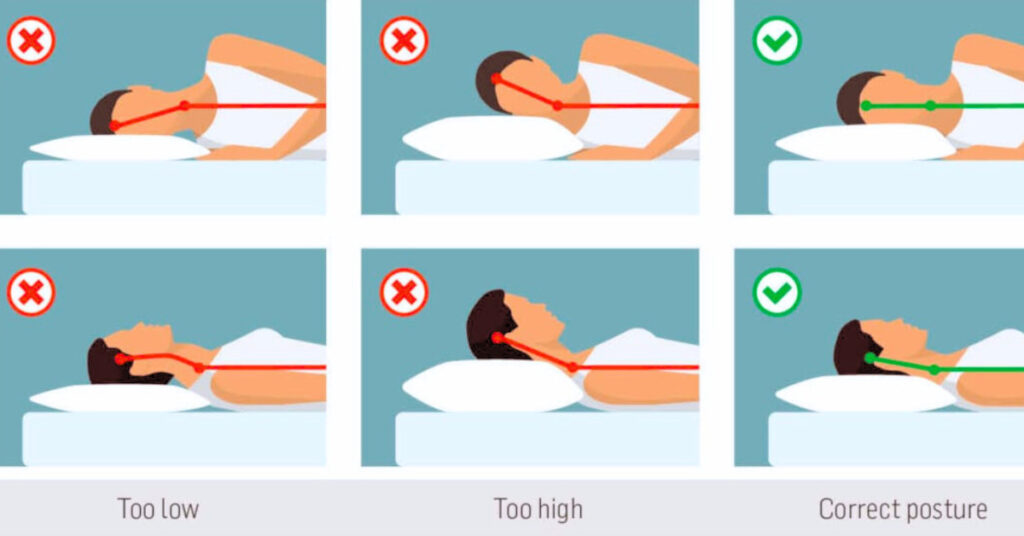Neck pain after sleeping often results from poor sleeping posture or using an unsuitable pillow. It can also be caused by muscle strain.
Waking up with neck pain can be frustrating and disruptive. Poor sleeping posture, such as sleeping on your stomach, can strain neck muscles. Using an unsuitable pillow that doesn’t support the neck’s natural curve can also lead to discomfort. Ensuring a supportive pillow and maintaining proper alignment can help prevent neck pain.
Stiffness and discomfort may also arise from underlying conditions like cervical spondylosis. Stretching exercises, good sleep hygiene, and ergonomic adjustments to your sleeping environment can alleviate pain. Consult a healthcare professional if neck pain persists. Making simple changes can significantly improve sleep quality and reduce neck pain.
Causes Of Neck Pain
Neck pain after sleeping can be a frustrating experience. Many factors contribute to this discomfort. Understanding the causes of neck pain is the first step in finding relief. Two major causes are poor sleep position and pillow issues.
Poor Sleep Position
Poor sleep positions often lead to neck pain. Sleeping on your stomach is a common culprit. This position twists the neck and spine. Twisting puts a lot of strain on the muscles and joints. It is important to maintain a neutral position while sleeping. Here are some tips to improve sleep positions:
- Sleep on your back: This is the best position for neck health.
- Use a pillow to support your neck: This keeps the spine aligned.
- Avoid sleeping on your stomach: This position causes the most strain.
- Keep your head and neck aligned: Use a pillow that helps with alignment.
Switching sleep positions can be hard, but it is worth it. Proper alignment can reduce neck pain significantly. Pay attention to how your neck feels in the morning. This will help you find the best position for you.
Pillow Issues
Pillow issues are another leading cause of neck pain. The wrong pillow can cause your neck to bend awkwardly. This results in discomfort and pain. Different types of pillows can affect your neck differently. Here are some common pillow problems and their solutions:

| Pillow Problem | Solution |
| Pillow is too high or too low | Choose a pillow with the right height to keep your neck aligned |
| Pillow is too firm or too soft | Select a pillow with medium firmness for proper support |
| Pillow loses shape quickly | Opt for a high-quality pillow that maintains its shape |
Choosing the right pillow can make a big difference. Memory foam pillows are a good option. They provide excellent support and help maintain neck alignment. If you prefer another type, ensure it supports your neck well. The right pillow can help you wake up pain-free.
Symptoms To Watch
Neck pain after sleeping is a common issue many people face. It can disturb your daily activities and overall well-being. Understanding the symptoms to watch can help you address the problem effectively. This blog post will discuss the symptoms of neck pain after sleeping, including pain intensity and range of motion.
Pain Intensity
Neck pain intensity can vary from mild discomfort to severe pain. It is essential to recognize the level of pain you are experiencing. Mild neck pain might feel like a slight stiffness. On the other hand, severe neck pain can be sharp and debilitating.
Some common indicators of pain intensity include:
- Mild pain: Slight discomfort or stiffness, often goes away with movement.
- Moderate pain: Persistent discomfort, may require pain relief methods.
- Severe pain: Sharp or stabbing pain, can limit daily activities.
Tracking your pain intensity can help in finding the right treatment. Use a pain scale from 1 to 10 to assess your pain. This can help your doctor understand your condition better.
Range Of Motion
Range of motion refers to how much you can move your neck in different directions. Limited range of motion can be a sign of neck pain. It can affect your ability to turn your head, look up or down.
Common symptoms indicating limited range of motion include:
- Difficulty turning your head: Feeling stiff or unable to turn your head easily.
- Pain while moving: Experiencing pain when trying to move your neck.
- Muscle tightness: Feeling tight muscles around the neck and shoulders.
Improving your range of motion can help reduce neck pain. Simple neck exercises and stretches can be beneficial. Always consult a healthcare provider before starting any exercise routine.
Impact On Daily Life
Neck pain after sleeping can affect your whole day. It can make simple tasks hard to do. You might find it hard to turn your head. This pain can ruin your mood and reduce your happiness. Understanding why this happens can help you fix it. Let’s explore how neck pain impacts your sleep and work.
Sleep Quality
Neck pain can make it hard to get a good night’s sleep. Painful neck can wake you up at night. You might toss and turn to find a comfortable position. This can lead to poor sleep quality. Poor sleep can make you feel tired the next day. Here are some ways neck pain affects sleep:
- Difficulty finding a comfortable position
- Waking up frequently
- Feeling tired in the morning
Using the right pillow can help. A pillow that supports your neck can reduce pain. A firm mattress can also help. Here is a table of pillow types:

| Pillow Type | Benefits |
| Memory Foam | Supports neck and head |
| Feather Pillow | Soft and adjustable |
| Orthopedic Pillow | Designed to support neck |
Work Performance
Neck pain can make it hard to work. Pain can distract you. This makes it hard to focus. You might find it hard to sit at a desk. This can reduce your work performance. Here are some ways neck pain affects work:
- Difficulty focusing on tasks
- Reduced productivity
- Increased stress levels
Proper ergonomics can help. Adjust your chair and desk to support your neck. Take breaks to stretch. Here is a table of ergonomic tips:
| Tip | Benefit |
| Adjust chair height | Reduces strain on neck |
| Use a headset | Avoids holding phone with neck |
| Take breaks | Prevents stiffness |
Prevention Techniques
Neck pain after sleeping is a common issue many people face. It can affect daily activities and reduce comfort. Proper prevention techniques can help avoid this discomfort. These techniques focus on using the right pillow and improving sleep posture.
Choosing The Right Pillow
The pillow you use plays a crucial role in neck health. A good pillow should support your neck and keep it aligned with your spine. Memory foam pillows are a popular choice because they adjust to the shape of your head and neck. Feather pillows can also be a good option as they are soft and moldable. Orthopedic pillows are designed to maintain neck alignment and provide extra support.
When selecting a pillow, consider the following tips:
- Ensure the pillow height matches your sleep position.
- Replace your pillow every 1-2 years for optimal support.
- Check for hypoallergenic materials if you have allergies.
Here is a comparison table of different pillow types:
| Pillow Type | Pros | Cons |
| Memory Foam | Adapts to your shape, good support | Can be hot, may have a smell |
| Feather | Soft, moldable | Can flatten over time, may cause allergies |
| Orthopedic | Maintains alignment, extra support | Can be expensive, not as soft |
Sleep Posture Tips
Proper sleep posture is essential for avoiding neck pain. Sleeping on your back or side is generally the best position. Back sleeping helps keep the spine aligned. Place a small pillow under your neck for extra support. Side sleeping can also be beneficial. Use a pillow that keeps your neck in a neutral position.
Avoid sleeping on your stomach. This position can strain your neck and cause pain. If you must sleep on your stomach, use a very thin pillow or none at all. This reduces the angle of your neck.
Additional tips for better sleep posture:
- Keep your head and neck aligned with your spine.
- Use a pillow between your knees if you sleep on your side.
- Ensure your mattress supports your body type and sleep style.
By following these tips, you can improve your sleep posture and reduce the risk of neck pain.
How To Stop Neck Pain From Sleeping

Many people wake up with neck pain after a night’s sleep. This discomfort can affect your entire day. Understanding the causes and solutions can help you wake up pain-free. Follow these tips to reduce or eliminate neck pain.
Choose The Right Pillow
The right pillow can make a big difference. A pillow that is too high or too low can strain your neck. Look for a pillow that supports the natural curve of your neck.
Memory foam pillows are often a good choice. They mold to the shape of your neck and head. This gives you the support you need while you sleep.
Sleep Positions Matter
Sleeping on your back is often the best position for your neck. This position keeps your spine in a neutral position. If you sleep on your side, use a pillow that keeps your neck in line with your spine.
Avoid sleeping on your stomach. This position twists your neck and can lead to pain. Try to train yourself to sleep on your back or side.
Stretch Before Bed
Gentle neck stretches before bed can help. Stretching can relax your muscles and reduce tension. Here are some simple stretches:
- Neck tilts: Tilt your head to the side, then the other side.
- Neck turns: Turn your head left, then right.
- Chin tucks: Pull your chin towards your chest, then relax.
Maintain Good Posture
Good posture is important even while you’re awake. Sit and stand with your shoulders back and head up. Avoid slouching or leaning forward for long periods.
A good posture during the day can lead to better sleep posture. This can help reduce neck pain over time.
Stay Hydrated
Hydration plays a role in muscle health. Drink plenty of water throughout the day. Dehydrated muscles can become stiff and painful, including those in your neck.
Keep a water bottle with you as a reminder to drink. This simple habit can improve your overall health and reduce neck pain.
Home Remedies
Waking up with neck pain can ruin your day. It can be caused by bad sleeping positions or using the wrong pillow. Many people suffer from this pain. Luckily, there are simple home remedies to help you feel better. Heat therapy and gentle stretching are two effective methods you can try at home.
Heat Therapy
Heat therapy is a great way to ease neck pain. It helps to relax the muscles and improve blood flow. You can use heating pads, warm towels, or even take a hot shower. Here are some steps to follow:
- Use a heating pad on the painful area for 15-20 minutes.
- Soak a towel in warm water, wring it out, and place it on your neck.
- Take a hot shower and let the warm water hit your neck.
Make sure the heat is not too hot to avoid burns. Repeat these steps 2-3 times a day for the best results. Heat therapy can provide quick relief and help you get back to your normal routine.
Gentle Stretching
Gentle stretching can also help reduce neck pain. It helps to loosen tight muscles and improve flexibility. Always do these stretches slowly and gently:
- Neck Tilt: Tilt your head to one side, then the other. Hold for 10 seconds each side.
- Neck Turn: Turn your head to look over each shoulder. Hold for 10 seconds each side.
- Chin Tuck: Tuck your chin towards your chest. Hold for 10 seconds.
Repeat these stretches 3-5 times a day. Be careful not to overstretch or force your neck. Gentle stretching helps in reducing stiffness and improving mobility. It’s important to stay consistent with these stretches to see improvement.
How To Fix A Stiff Neck From Sleeping Wrong?
Waking up with a stiff neck is a common problem. It can ruin your day right from the start. Finding relief quickly is important. Here are some simple steps to help you get rid of neck pain after sleeping wrong.
Use A Warm Compress
Applying a warm compress can help. It relaxes the muscles and eases the pain. Use a warm towel or a heating pad. Apply it to your neck for 15-20 minutes.
Try Gentle Stretches
Gentle stretches can help loosen the neck muscles. Tilt your head to one side and hold. Then, tilt it to the other side. Repeat this several times to relieve stiffness.
Stay Hydrated
Drinking water is essential for muscle health. Dehydration can make muscles stiff. Aim for 8 glasses of water a day. Keep a water bottle by your bed.
Check Your Pillow
Your pillow may be causing your neck pain. Ensure it supports your neck properly. A pillow that’s too high or too low can cause problems. Consider a memory foam pillow for better support.
Over-the-counter Pain Relief
Over-the-counter pain relief can help manage the pain. Ibuprofen or acetaminophen are good choices. Always follow the dosage instructions on the label.
Massage The Area
A gentle neck massage can work wonders. Use your fingers to massage the sore area. This improves blood flow and reduces stiffness. You can also use a massage tool if you have one.
Practice Good Posture
Good posture is key to preventing neck pain. Sit and stand up straight. Avoid slouching. Use a chair with good back support. Keep your computer screen at eye level.
When To Seek Help
Neck pain after sleeping can be a frustrating problem. It disrupts your day and affects your well-being. Knowing when to seek help is important. Understanding the signs can guide you to the right treatment. This blog post will discuss chronic pain and associated symptoms.
Chronic Pain
Chronic neck pain lasts for weeks or even months. It can make daily tasks difficult. Persistent pain in the neck is a key sign of chronic issues. It often requires medical attention.
Common causes of chronic neck pain include:
- Incorrect sleeping positions
- Old pillows or mattresses
- Injury or strain
- Underlying medical conditions
Symptoms of chronic pain might include:
- Stiffness
- Reduced range of motion
- Constant ache
- Sharp or stabbing pain
Consulting a doctor is crucial if pain persists. Physical therapy, medications, and lifestyle changes can help manage chronic pain.
Associated Symptoms
Neck pain often comes with other symptoms. Recognizing these can help identify the problem. Headaches are a common companion to neck pain. They can range from mild to severe.
Numbness or tingling in arms or hands might occur. This can signal nerve involvement. Muscle weakness is another concerning sign.
Dizziness can also be related to neck pain. It affects balance and coordination. Difficulty swallowing or a feeling of a lump in the throat might be present.
If you notice these symptoms, seek medical advice. Early diagnosis and treatment can prevent complications. Understanding these signs helps in managing neck pain effectively.

Treatment Options
Neck pain after sleeping is a common issue that many people experience. It can be caused by various factors such as poor sleeping posture, an unsupportive pillow, or even stress. Waking up with neck pain can affect your daily activities and overall quality of life. Fortunately, there are several treatment options available that can help alleviate this discomfort. This blog post will discuss two of the most effective treatments: physical therapy and medications.
Physical Therapy
Physical therapy is a highly effective treatment for neck pain after sleeping. It involves various exercises and techniques aimed at reducing pain and improving mobility. A physical therapist can design a personalized exercise plan for you. These exercises can help strengthen the muscles around your neck and improve your posture.
Here are some common physical therapy techniques:
- Stretching exercises: These help to loosen tight muscles and improve flexibility.
- Strengthening exercises: These focus on building the muscles that support your neck.
- Posture training: This helps you maintain a better posture while sleeping and during the day.
- Manual therapy: The therapist uses their hands to apply pressure and massage the neck area.
A physical therapist may also use other techniques like heat therapy, cold therapy, or ultrasound therapy. These methods can help reduce inflammation and promote healing. Consistency is key when it comes to physical therapy. Regular sessions can lead to significant improvements over time.
Medications
Medications are another option for treating neck pain after sleeping. They can help reduce pain and inflammation, making it easier to perform daily activities. Over-the-counter pain relievers like ibuprofen and acetaminophen are commonly used. These medications can provide quick relief from mild to moderate pain.
For more severe pain, a doctor may prescribe stronger medications. These could include muscle relaxants or prescription-strength pain relievers. It’s important to follow the doctor’s instructions when taking these medications. Long-term use of pain relievers can lead to side effects, so they should be used with caution.
Some people also find relief from topical medications. These are creams or gels that you apply directly to the painful area. They can provide targeted relief and are less likely to cause systemic side effects.
Combining medications with other treatments like physical therapy can lead to better results. Always consult with a healthcare professional before starting any new medication.
Lifestyle Adjustments
Neck pain after sleeping can ruin your day. It often stems from poor sleeping positions or unsuitable pillows. Making small changes to your daily routine can help. Lifestyle adjustments play a key role in preventing and managing neck pain.
Ergonomics At Work
Proper ergonomics at work can reduce neck pain. A well-arranged workstation is essential. The computer screen should be at eye level. This helps to maintain a neutral neck position.
Consider using a chair with good support. Adjust the chair height so your feet rest flat on the floor. Keep your shoulders relaxed and elbows at a 90-degree angle.
Here are some tips:
- Sit upright with your back against the chair.
- Place the keyboard and mouse within easy reach.
- Take regular breaks to stretch and move around.
A sit-stand desk can also be beneficial. It allows you to switch between sitting and standing. This change can reduce strain on your neck and back.
Exercise Routines
Regular exercise can alleviate neck pain. Gentle stretches and strength exercises are highly effective. Yoga and Pilates are excellent choices. They focus on flexibility and core strength.
Here are some exercises to try:
- Neck tilts: Slowly tilt your head towards your shoulder. Hold for 10 seconds and repeat on the other side.
- Shoulder rolls: Roll your shoulders forward and backward in a circular motion.
- Chin tucks: Tuck your chin towards your chest. Hold for a few seconds and release.
Strengthening your neck muscles can also help. Simple resistance exercises can be done with a band or light weights. Always warm up before exercising and cool down afterward.
Long-term Management
Experiencing neck pain after sleeping is a common issue that can disrupt daily life. Proper long-term management is crucial for alleviating discomfort and preventing future occurrences. This blog post discusses the importance of regular check-ups and ongoing care strategies to manage neck pain effectively.
Regular Check-ups
Regular check-ups play a vital role in managing neck pain. Visiting a healthcare provider helps in identifying the root cause of the discomfort. Early detection of any underlying issues can prevent complications.
Here are some benefits of regular check-ups:
- Early Diagnosis: Identifies problems before they worsen.
- Personalized Treatment: Tailors care plans to individual needs.
- Monitoring Progress: Keeps track of improvements and setbacks.
It’s essential to communicate openly with healthcare providers. Share any changes in symptoms or new concerns. Regular check-ups ensure a comprehensive approach to managing neck pain.
Below is a table summarizing the importance of regular check-ups:
| Benefit | Description |
| Early Diagnosis | Identifies issues before they become severe |
| Personalized Treatment | Ensures care plans are tailored to individual needs |
| Monitoring Progress | Tracks improvements and setbacks over time |
Ongoing Care Strategies
Effective ongoing care strategies are crucial for managing neck pain. These strategies help in maintaining a pain-free life.
Consider the following strategies:
- Proper Sleep Position: Use pillows that support the neck.
- Regular Exercise: Strengthens neck muscles and improves flexibility.
- Stress Management: Reduces tension that can lead to neck pain.
- Ergonomic Adjustments: Ensures workstations support good posture.
- Hydration: Keeps the discs in the neck hydrated.
Proper sleep position is vital for neck health. Use a supportive pillow and maintain a neutral spine position. Regular exercise strengthens the neck muscles and improves flexibility.
Effective stress management reduces muscle tension that can lead to neck pain. Ergonomic adjustments at workstations ensure proper posture, preventing strain. Staying hydrated is also crucial as it keeps the discs in the neck hydrated.
Conclusion
Waking up with neck pain can disrupt your day. By addressing your sleep environment and habits, you can minimize discomfort. Simple changes can greatly improve your quality of sleep. Seek medical advice if pain persists. Prioritize proper support to enjoy restful, pain-free nights.

